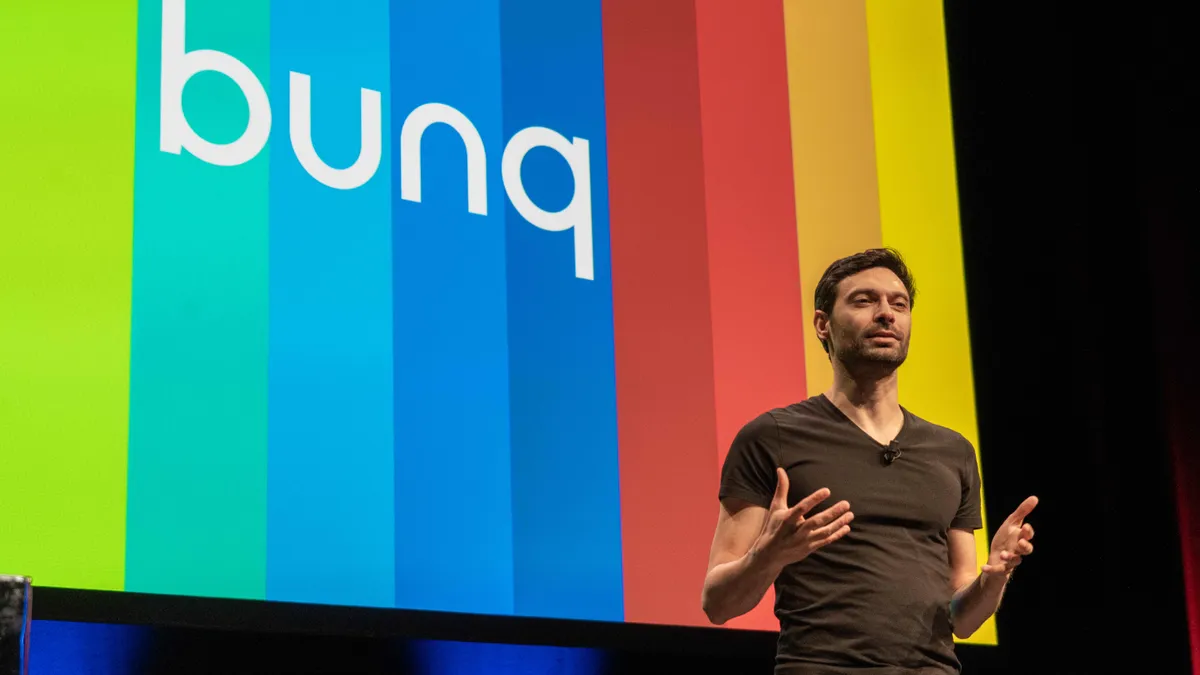Earlier this year, Dutch neobank Bunq announced ambitious plans to launch in the U.S., a market that has proved a difficult one to crack for a number of its European counterparts.
Ahead of its debut, the firm is attempting to secure a U.S. bank charter instead of partnering with a traditional bank, a decision CEO Ali Niknam said more closely aligns with the neobank’s mission.
“At Bunq we’d rather do things right than rush things,” he said. “And for us to be able to deliver the user experience that we want to deliver, we need to have end-to-end control on the entire chain. And the only way for us to be able to do that is by having our own bank.”
The fintech has taken the same approach in The Netherlands, where it secured a banking license in 2012.
Bunq, which claims to have 9 million users and over €4.5 billion ($4.9 billion) in user deposits, announced in April that it had filed applications for a U.S. license with the Office of the Comptroller of the Currency and the Federal Deposit Insurance Corp.
Niknam described the firm’s conversations with U.S. bank regulators as “tough but fair.”
“The dialogue has been very constructive. I think it is very similar to the dialogue we had with the Dutch regulator,” he said. “I'm pretty sure we can iron out any concerns they may have.”
Niknam declined to share specific concerns highlighted by regulators, but said in the past, U.S. agencies have had concerns about the long-term feasibility of some of Bunq’s peers.
“That's one of the concerns that won't exist with Bunq because we are profitable,” he said.
The Amsterdam-based company reported its first quarterly profit of $2.5 million in the fourth quarter of 2022, according to Reuters.
“In general, I would say none of the questions that we've been asked so far surprised us,” he said. “These are questions that I would, frankly, ask myself if I were in that position. I think they're very prudent.”
Niknam, who splits his time between Amsterdam and New York, where he owns an apartment, said he’s “very bullish” on the U.S. market.
“I love this country. … I spend a lot of time here,” he said. “And I think what will set us apart from all the other players is that we actually have a product that many users value and I can't wait for us to get started in this country.”
Niknam, who founded the company in 2012, said Bunq’s business model and target demographic set it apart from the digital players who have tried and failed to plant a flag in the competitive U.S. market.
Bunq offers members a free savings account, and makes additional features available for a monthly subscription of 3 to 18 euros per month.
Niknam said Bunq’s upfront pricing structure means the firm is transparent about its fees.
“Many traditional banks have all kinds of hidden fees, like penalty fees for overdrafts or markups for foreign exchange,” he said. “I appreciate that in the U.S. [the subscription model] might be a bit uncommon, but many people are used to paying for their Amex card or for a different credit card. Although other banks might not openly charge fees, they have a lot of hidden fees and people are used to paying fees here. So we believe our model would work here.”
The road ahead
The move to secure a U.S. banking license puts Bunq on a lengthy and presumably expensive path.
Varo Bank, which in 2020 became the first neobank to secure a U.S. banking license, spent nearly $100 million on the endeavor.
Revolut, a U.K.-based neobank that launched in the U.S. in 2020, has been trying to secure a U.S. banking license since early 2021.
Monzo, another U.K. neobank, withdrew its application for a banking charter with the OCC in October 2021 after it became clear the regulator likely would not approve it, the fintech told the Financial Times.
Meanwhile, Berlin-based N26 scaled back its own plans to expand in the U.S. in November 2021, ending a 2½-year stateside push that began when it launched its app to a 100,000-customer U.S. waitlist in July 2019.
“Our motivation is different,” said Niknam, addressing the several European fintechs that have tried to capture the U.S. market. “From the outset, it seems that some of our peers wanted to move to the U.S. because they were trying to get as many countries as quickly as they could. They didn't necessarily have an understanding of market needs.”
Niknam argues there is strong interest for Bunq to launch its banking services in the U.S.
“We can see from the requests coming in that the U.S. is the No. 1 location where our existing users would like us to go to. There is a lot of research on the major hubs for digital nomads, and unsurprisingly, the U.S. ranks right at the top end of that list,” he said.
Digital nomads, a demographic of professionals who work abroad or travel frequently for work, is Bunq’s core user, Niknam said.
“Traditional banks are very unsuccessful in servicing these people, because traditional banks were made in a period where people just lived and worked and had their partners in one country,” he said. “Bunq is really great for digital nomads, because it's a modern platform, and it allows them to do whatever they want, whenever they want, with whomever they want.”























